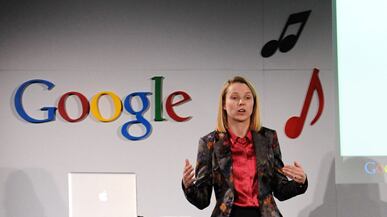For years, Google has rampaged through the tech business, radically transforming (and usually improving) virtually everything it touches, from book digitization to street maps. Now, it has honed in on the music world.
A few days ago, the upcoming version of the music application for Android—Google’s software for smartphones—was reported to have been accidentally leaked to a tech news blog called Tech From 10. The blog promptly made the app available for download, and though it couldn't quite get the service to work at that time, its exposure was nonetheless a bombshell in the tech world.

That’s because the leaked app provided the most stark indication yet that Google is hard at work on a "cloud" service, which is reportedly being tested by the web giant’s employees. If it’s true that Google is wading into the world of music consumption by cloud, it could once again revolutionize the music industry, which has been rocked by one tech upheaval after another.
What exactly is a cloud, and how could it make the average music fan's life a lot easier? Essentially, cloud computing means being able to access data resources on-demand via a shared pool of computer networks with little management effort or service-provider interaction. One can easily access the information from, for example, a Web browser, even though the software or data is actually stored on servers elsewhere. The beauty of this model is that it provides one single point of access for computing needs. Think of it as similar to how you get electricity directly into your home from a complex grid system. You can access this electricity anytime with no knowledge required of how the grid system works. Now, imagine that same principal applied to access to your music.
Gone is the problem of downloading your favorite track to one device, only to realize that you would then like to have it on a different device at a later date, and so on. With the cloud, you can have access to all of your songs on any of your devices—or indeed, from anyone else’s devices—at any time, anywhere, because the songs aren’t on your device at all. They’re in the cloud.
"It seems the dreams about the future of music that a kid named Shawn (Fanning of Napster) had in the late ‘90s are finally beginning to take shape in the mainstream, " Pete Wentz of Fall Out Boy told The Daily Beast.
"All-you-can-stream services, your entire collection on your phone, and now your entire collection accessible anywhere in the world in the cloud from any computer or device. It's enough to make George Jetson proud."
Cloud service may be eliciting hallelujahs from consumers and some artists, but the traditional music industry’s views are more mixed. The tech world has long held an uneasy relationship with the music industry, which often worries that each new technological innovation equals more free music. And Google's cloud system does indeed pose a particular challenge for the labels. Michael Robertson is the CEO of MP3tunes, which offers a form of cloud service that allows users to store their personal collections online and listen on computers. "You ask about what the music companies think? Well at least one of the major record labels despises personal music storage. I know this because they sued MP3tunes for offering cloud services. We're awaiting a judge’s ruling—all the arguing has been done and papers submitted. Either way, it should set some precedents in the industry."
The tech world has long held an uneasy relationship with the music industry, which often worries that each new technological innovation equals more free music.
Given that urban music, particularly hip hop, often holds the majority of top slots in many of the charts—from ringtones to digital downloads—this genre might have the most to lose. Sha Money XL is Senior Vice-President of A&R at the legendary Island Music Def Jam Group and the "ears" credited with discovering the multi-platinum rap artist 50 Cent. Though he works with a website called Fileblaze.net that’s a form of cloud service, he also worries that once Google gets into the cloud business, its sheer size will mean every song is available everywhere all the time. ‘[Google] will do very well with this. Apple has their version but Google will speak to PC users and Apple users.” He adds, “I wouldn't be for [clouds] as a label 'cause all I have to do is give my friends access to my account and they get my music free.”
Even some of the most tech-savvy industry names are watching cloud technology with a wary eye. The Grammy-winner and digital pioneer Chamillionaire is a rap artist who embraced tech possibilities years ago. (He was rewarded for his early adoption of the digital realm in 2006 by having the most downloaded ringtone at the time.) When it comes to the cloud, though, he has mixed feelings. "I’m currently a Spotify user,” he says, referring to the popular music-streaming service, “who loves the thought of being able to access all of my music via the cloud and on multiple devices.” But, he says, "I also don't think most artists would be too excited about being paid royalties from streamed-music plays, as opposed to individual song download royalties.” (Since recording artists are paid mere cents on streamed music as opposed to a significant percentage of actual downloaded tracks, cloud services could adversely effect how much these musicians make.) Nevertheless, he believes that “this is where the future of music sharing is definitely headed.”
Adam Klein, CEO of eMusic, agrees. “Google is just one of many players developing cloud-based music lockers. With new players entering the space, new consumer expectations are emerging… What the music industry and consumers need is a service that allows not only for music storage, but also for new music discovery and sharing, all through one simple platform.”
Only time will tell whether these clouds will ultimately become part of a larger ecosystem from which money rains down upon artists, or if the payday remains exclusively with the tech companies. For now it's a game of wait and see.
Lauren DeLisa Coleman is a socio-economic digitalist who writes, speaks and consults about the business and cultural impact of Gen Y with digital platforms. Her work has appeared in such media outlets as The Huffington Post, Business Insider, The Atlanta Post and The Network Journal.






